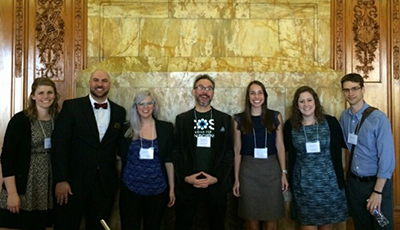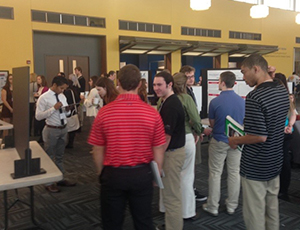Showcasing Psychological Science: A Conference for High School Students and Teachers

Conference director Brian Collisson alongside social, health, quantitative, and counseling psychologists. (Left to right: Emily Collisson, Brian Collisson, Amanda Gesselman, Greg Webster, Corinne Novell, Jenny Howell, and Blake Allan)
Many initiatives promote psychological science among college students and their teachers, but their high school counterparts often are left out. To address this issue, faculty at Marian University, with the support of the APS Fund for Teaching and Public Understanding of Psychological Science, created a conference to showcase psychological science and pedagogy for high school students and teachers in Indiana.
To highlight the science of psychology, James McKeen Cattell APS Fellow Scott Lilienfeld (Emory University) and Leslie Ashburn-Nardo (Indiana University–Purdue University Indianapolis) discussed the differences between psychological science and pseudoscience. Afterwards, students learned about many different career opportunities in psychological science by meeting local psychologists who work in sports, business, school, health, social services, law, counseling, market analysis, and consumer behavior.

Students present their own scientific research at the Showcasing Psychological Science and Pedagogy Conference.
The first annual Showcasing Psychological Science and Pedagogy Conference at Marian University attracted more than 130 people. Attendees included 46 high school students from 14 different high schools in the greater Indianapolis area, 53 college students and instructors from 15 different institutions across America, and 31 local psychology professionals. More information about the conference and registration information for next year can be found online at www.marian.edu/spsp.





APS regularly opens certain online articles for discussion on our website. Effective February 2021, you must be a logged-in APS member to post comments. By posting a comment, you agree to our Community Guidelines and the display of your profile information, including your name and affiliation. Any opinions, findings, conclusions, or recommendations present in article comments are those of the writers and do not necessarily reflect the views of APS or the article’s author. For more information, please see our Community Guidelines.
Please login with your APS account to comment.